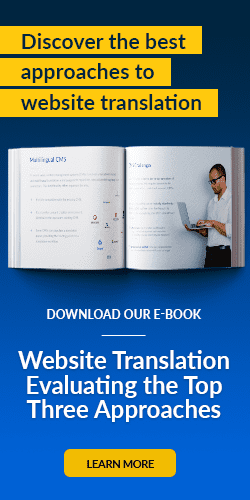Serving global customers online is a great way to grow your business-and a localized website is the best way to reach them. For most companies, a localized website is essential to finding new customers and retaining existing ones. The benefits of website translation can be seen across brand reach, revenue, SEO, and customer satisfaction.
Why? It varies depending on industry, existing global market share, and other factors. But there are a few solid reasons to translate your website for multilingual and global customers. Here are 10:
1. You want to expand your brand reach.
Targeting multilingual and global markets is a great way to sustain company growth. A localized website helps you achieve the following:
- Drum up brand awareness
- Educate potential customers, distributors, employees, or partners about your brand and its offerings
- Provide engaging customer experiences by serving new customers in their preferred languages
Not sure you can handle a translation project while also focusing on your company's needs? Weigh the pros and cons of leveraging internal resources vs. partnering with a 3rd party for website translation. The benefits of website translation include greater visibility, wider engagement, and better ROI.
[Button: Download our FREE eBook]
2. Your brand is gaining popularity abroad.
Sometimes your reputation precedes you, and your brand takes off in a new market unexpectedly. If you discover unexpected overseas interest in your products or services, keep the momentum going by translating your website. A survey conducted by the European Commission found that 90% of Internet users in the EU always visit websites in their own language when given the choice. This highlights the benefits of website translation in reaching broader audiences and building trust through familiar language experiences.
3. You already do business abroad.
If you're already conducting business beyond your domestic market, it's best practice to localize website information and support for international customers. Customers are far more likely to do more business with your brand when they can read product descriptions, understand shipping and payment options and transact in the language they're most comfortable in.
So, what can you expect from translating your website for new markets? You'll be able to:
- Establish brand credibility and reputation in new markets. Your global customers want to experience your brand in their own language. By helping them navigate your translated website more easily, they will trust that you have the expertise to provide them with the best outcome.
- Increase revenue and instantly expand your TAM (total addressable market). The total addressable market is the total revenue opportunity that is available to a business if 100% market share was achieved for a product or service. By translating your website, you can gain instant access to a broader addressable market for every language you offer.
- Recruit local talent. If your company wishes to establish itself in a new global market, you may need to employ local contractors or well-known figures. Translating your website means not only will you reach them, but they can also reach out to you about brand opportunities.
These are just a few of the many benefits of website translation for international-facing businesses.
4. Your competitors aren’t doing it—yet.
Having a translated website can differentiate your brand from the competition. Entering a new market before your rivals can help you gain market share faster and empowers you to set the standards for quality and services that your competitors will have to meet later.
Here are some things to consider when entering a new market before it has been thoroughly explored:
- Pace of growth: You will want to consider the pace at which you'll likely grow in the new market. This will help you adequately prepare for rapid growth and keep customers happy.
- Establishing your position: Being first allows you to entrench yourself as a market leader. This makes it harder for competitors to take from your market share by creating a wide moat that establishes you as the incumbent solution.
- Localizations to new Ideal Customer Profiles (ICP): It is important to localize website content. Be aware of the different consumer preferences in each new language, and become culturally fluent. This ensures you aren't wasting resources or turning away potential customers by clashing with local customs. Your ideal customer profile (ICP) may change, and you need to adapt to that.
The benefits of website translation also include competitive edge and brand leadership in new markets.
5. Your competitors are already doing it.
If your competitors are already serving online customers in their preferred languages, you need to translate your website to remain relevant. The good news is that there are translation solutions that can get you into new markets fast, with brand-perfect translations that give you an edge in user experience (UX) and customer engagement.
By following in competitors’ footsteps, you can access information about:
- Determine which languages you should target. If your competition is translating its website content into Chinese and Greek, that could hint at a specific need within the Chinese and Greek communities for your company as well.
- Avoid wasteful translations. You don’t want to waste your time and money on website translations that don’t lead to more revenue or better customer retention.
It’s never too late to realize the benefits of website translation—especially when it keeps you competitive.
6. The law demands it.
Sometimes website translation is more than just best practice. In some markets and industries, it's a legal requirement. Certain countries and regions have laws and regulations requiring language access for those who need it. Failing to meet these regulations won't just result in lost business, but in penalties and fines, too.
Not sure if this applies to your business? See if you might be subject to fines, lawsuits, or even incarceration by neglecting your non-English speaking customers. In this case, the benefits of website translation are both business-critical and regulatory.
7. The data suggests it.
Your website analytics can uncover untapped markets and highlight areas that would benefit from multilingual websites. Key metrics to consider:
- Where is your traffic coming from beyond your domestic market?
- Are international visitors spending time navigating your site or bouncing?
- Are they converting, and can they? If you're seeing high bounce rates, a localized experience could boost engagement and conversions.
If you're targeting U.S. Hispanics, for example, translating your site into Spanish could attract customers not just from the U.S., but also from Spain or Colombia-markets with significant growth potential. These insights point clearly to the benefits of website translation as a data-driven business strategy.
8. You want the International SEO benefits.
Your website is more than a platform for customers to engage and transact with your brand – it is an essential part of your SEO strategy, internally or domestically, which boosts search rankings and organic traffic.
Website translation can help with SEO in several ways:
- Increases visibility in search engines: Translating your website into multiple languages can help your website appear in search results for those languages, leading to more traffic and potentially more customers.
- Improves user experience: When users visit your website in their native language, they are more likely to engage with your content and stay on your website longer. This can improve your website's bounce rate and increase user engagement.
- Builds backlinks: Translating your website can also increase the likelihood of receiving backlinks from other websites in different languages. These backlinks can improve your website's authority and ranking in search results.
- Expands your target audience: Translating your website can help you reach a wider audience in different countries and regions. This can increase the potential for conversions and revenue, as well as brand awareness.
Consider localized SEO as part of your global growth strategy-it's a powerful tool to help you expand your reach. And it's one of the most measurable benefits of website translation.
[Button: Learn More About Localized SEO]
9. You want a boost in traffic and revenue.
Global users who can’t read your website won’t find you, and if they don’t find you, they won’t convert. According to a study by Common Sense Advisory, businesses that translated their content saw a 2.67% increase in revenue compared to those that did not.
Translating your website content will attract new customers, increase your website traffic, and ultimately lead to conversions. Conversions need not be limited to on-site transactions, but lead generations and on-site engagement are also meaningful. Even non-transactional translated websites benefit in the form of completed contact forms, informational downloads, and a reduced amount of customer support call centers.
The benefits of website translation span all stages of the buyer journey—from awareness to conversion to retention.
10. You want to deliver a world-class customer experience.
Giving your multilingual and global customers an authentic online experience is the best reason to translate your website and can incorporate any or all the reasons above.
When you want to make new customers aware of your brand, support offerings you already provide, or do a better job of serving a market than your competitors, you do so by giving customers a CX that's just as good as your origin website's. Your customers don't just deserve that stellar experience-they expect it. Don't let them down. With the right partner, the benefits of website translation can be experienced immediately in user satisfaction and brand loyalty.
Conclusion
Did any of these reasons resonate with your business goals? Whether you’re aiming to expand your global reach, boost conversions, or improve customer engagement, translating your website is the key to unlocking new opportunities. The benefits of website translation are measurable, impactful, and increasingly essential. With MotionPoint’s Adaptive Translation™, you can access fast, high-quality translations powered by artificial intelligence, translation memory, and advanced algorithms—all while saving up to 60%.
Don't let language barriers hold your business back. Start delivering exceptional, localized experiences today and stay ahead of your competition.
Last updated on June 04, 2025

